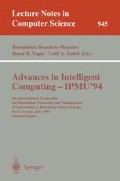Abstract
Logic programming languages such as Prolog are widely used. A clear shortcoming of these languages is that every predicate can take only two truth values. A natural development is to consider that predicates could have many possible values. Thus, the main goal of this paper is to present an interpreter for infinitely-valued propositional logic programming. Some issues concerning the efficiency of the interpreter are discussed, and the negation as failure and the cut operator are also defined and integrated in the present multiple-valued context. The properties of the interpreter algorithm are carefully analyzed. Some of the areas of application of this work are expert systems and logic programming.
Research partially supported by the project PB91-0334-C03-03 funded by the DGICYT and the project 94-13 funded by the Universitat de Lleida.
Preview
Unable to display preview. Download preview PDF.
References
Atanassov, K., and Georgiev, C. Intuitionistic fuzzy prolog. Fuzzy Sets and Systems 53 (1993), 121–129.
Baldwin, J. Evidential support logic programming. Fuzzy Sets and Systems 24 (1987), 1–26.
Béjar, R. Implementación de un intérprete proposicional y de un intérprete de primer orden para programación lógica multivaluada. EUP-Universitat de Lleida, 1993. (graduating project).
Dowling, W. F., and Gallier, J. H. Linear-time algorithms for testing the satisfiability of propositional horn formulae. Journal of Logic Programming 3 (1984), 267–284.
Dubois, D., Lang, J., and Prade, H. Poslog, an inference system based on possibilistic logic. Proceedings North American Fuzzy Information Processing Society Congress (1990), 177–180.
Escalada-Imaz, G.Optimisation d'Algorithmes d'Inference Monotone en Logique des Propositions et du Premier Ordre. Université Paul Sabatier, Toulouse, 1989. (PhD Thesis).
Escalada-Imaz, G., and Manyà, F. A linear interpreter for logic programming in multiple-valued propositional logic. In Proceedings of IPMU'94 (Paris, 1994), pp. 943–949.
Escalada-Imaz, G., and Manyà, F. Efficient Interpretation of Propositional Multiple-valued Logic Programs, IIIA Research Report 95-03, 1995.
Ghallab, M., and Escalada-Imaz, G. A linear control algorithm for a class of rule-based systems. Journal of Logic Programming 11 (1991), 117–132.
Godo, L.Contribució a l'Estudi de Models d'inferència en els Sistemes Possibilístics. FIB-UPC, Barcelona, 1990. (PhD Thesis).
Hähnle, R. Automated Deduction in Multiple-Valued Logics. Oxford University Press, 1993.
Lee, R. C. T. Fuzzy logic and the resolution principle. Journal of the Association for Computing Machinery 19, 1 (1972), 109–119.
Li, D., and Liu, G. A Fuzzy Prolog Database System. Research Studies Press and John Wiley and Sons, 1990.
Lloyd, J. W. Foundations of Logic Programming. Springer-Verlag, 1987.
Martin, T., Baldwin, J. F., and Pilsworth, B. W. The implementation of fpprolog: A fuzzy prolog interpreter. Fuzzy Sets and Systems 23 (1987), 119–129.
Mukaidono, M. Fundamentals of fuzzy prolog. International Journal of Aproximate Reasoning 3 (1989), 179–193.
Puyol, J., Godo, L., and Sierra, C. A specialisation calculus to improve expert systems communication. In ECAI'92 (Vienna, 1992 (extended version:IIIA Research Report 92/8), pp. 144–148.
Tamburrini, G., and Termini, S. Towards a resolution in a fuzzy logic with lukasiewicz implication. In Proceedings of IPMU'92 (Paris, 1992), pp. 271–277.
Trillas, E., and Valverde, L. On mode and implication in approximate reasoning. In Approximate Reasoning in Expert Systems, M. M. Gupta et al., Ed. North Holland, 1985.
Weigert, T. J., Tsai, J., and Liu, X. Fuzzy operator logic and fuzzy resolution. Journal of Automated Reasoning 10 (1993), 59–78.
Author information
Authors and Affiliations
Editor information
Rights and permissions
Copyright information
© 1995 Springer-Verlag Berlin Heidelberg
About this paper
Cite this paper
Escalada-Imaz, G., Manyà, F. (1995). Efficient interpretation of prepositional multiple-valued logic programs. In: Bouchon-Meunier, B., Yager, R.R., Zadeh, L.A. (eds) Advances in Intelligent Computing — IPMU '94. IPMU 1994. Lecture Notes in Computer Science, vol 945. Springer, Berlin, Heidelberg. https://doi.org/10.1007/BFb0035976
Download citation
DOI: https://doi.org/10.1007/BFb0035976
Published:
Publisher Name: Springer, Berlin, Heidelberg
Print ISBN: 978-3-540-60116-6
Online ISBN: 978-3-540-49443-0
eBook Packages: Springer Book Archive

